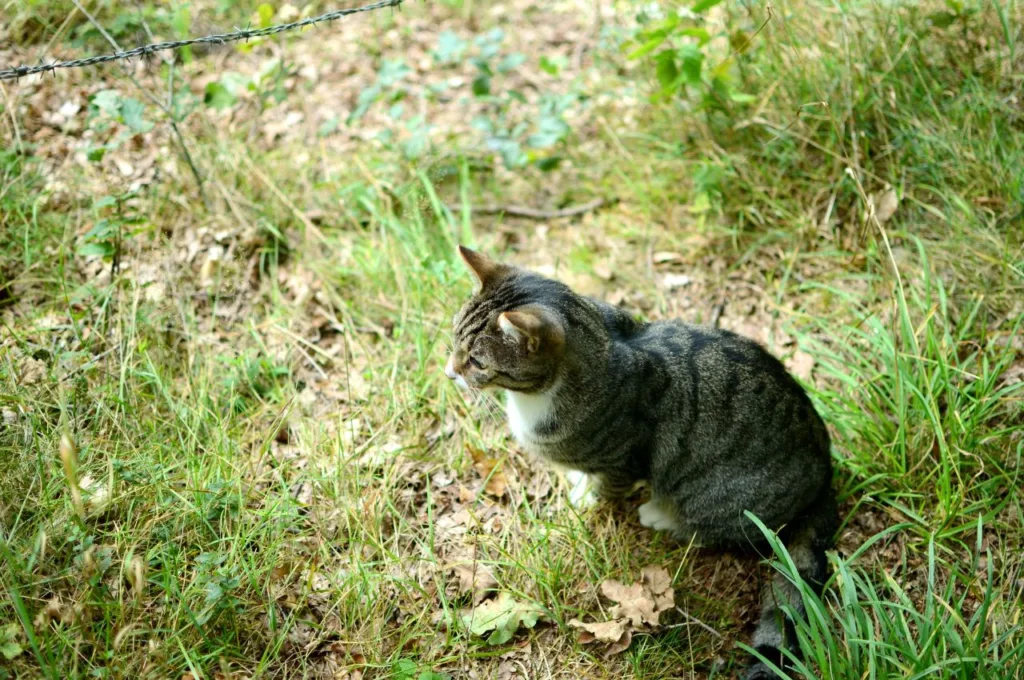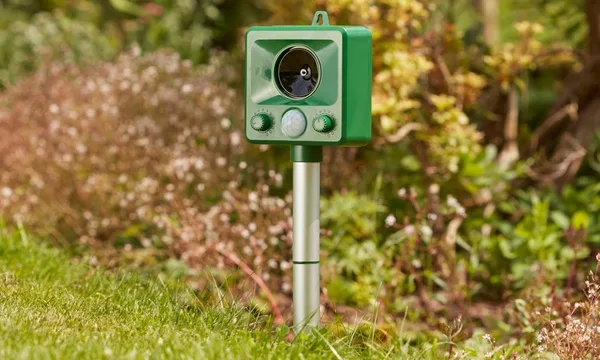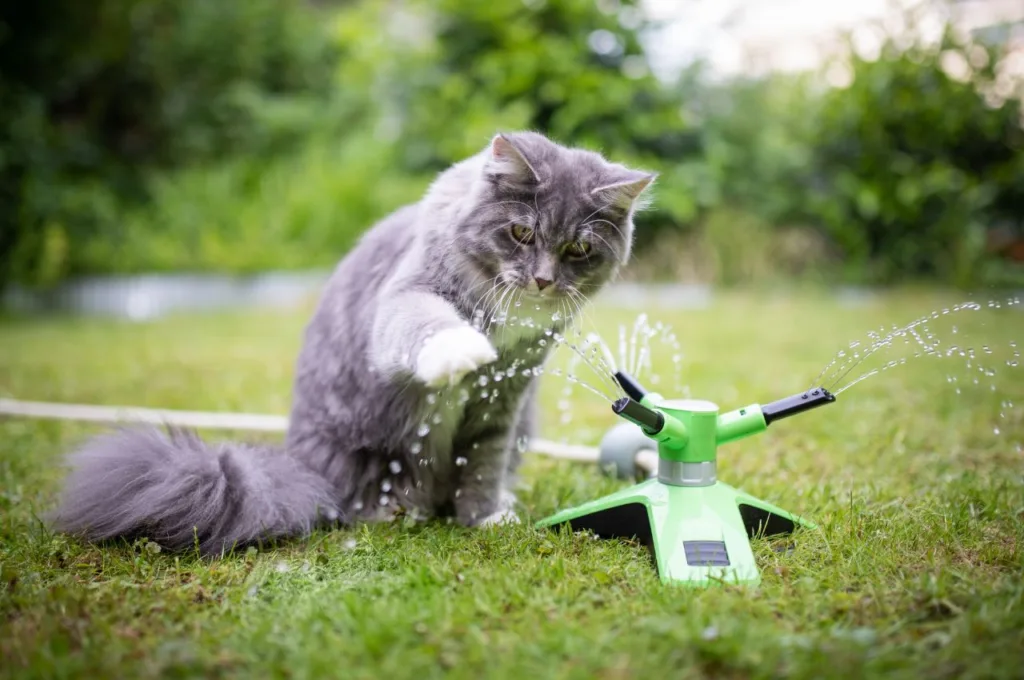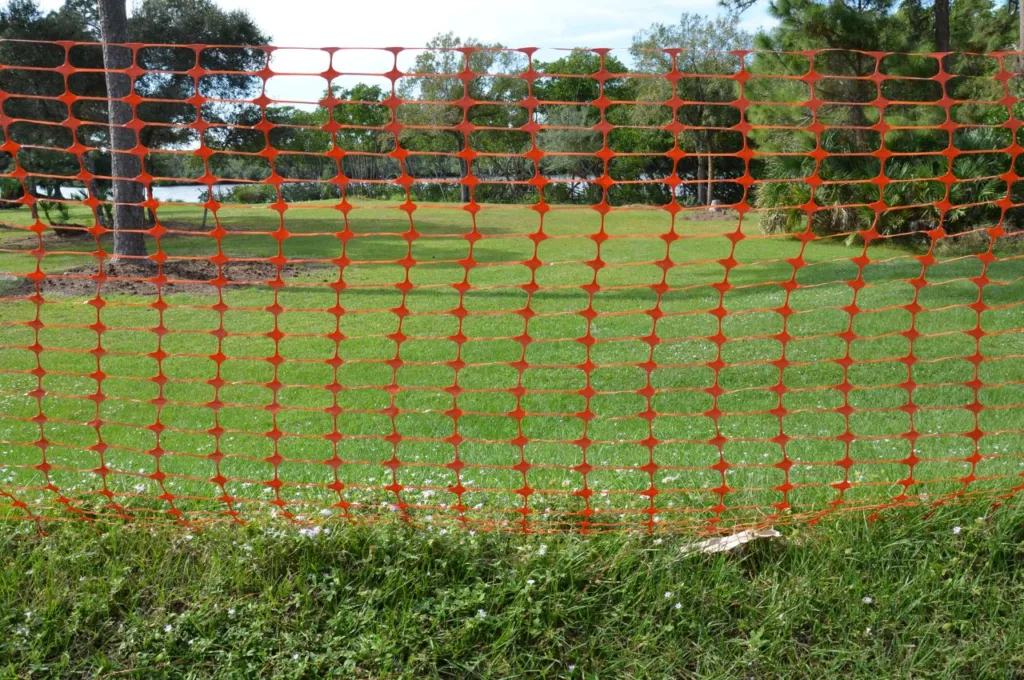No matter how much you might love cats, you probably don’t love their wee.
Unfortunately, cats don’t have the same rules as humans when it comes to respectful toilet habits, and they use spraying to mark their territory and attract other neighbourhood cats during mating season.
If you’re on a mission to stop cats spraying on your lawn, you’ve come to the right place. I live in a neighbourhood with a thriving cat population, and over the past 12 months, I’ve tried and tested the best methods to stop cats from spraying on my lawn. Here are the methods that worked for me best.
Table of Contents

🐱 6 Best Methods To Stop Cats From Spraying On Your Lawn
Below, I’ve shared the best ways to stop neighbourhood cats from spraying in your garden, starting with the most effective:
🔊 Method 1: Use An Ultrasonic Animal Repellent
My personal favourite method, and the one I saw success with, was to buy an ultrasonic animal-repellent device (here’s the Amazon link to the product I bought), which emits high-frequency sounds that are unpleasant for cats, repelling them from your lawn.
I simply inserted the device into the soil in one of my planters and let it do its thing. Most repellents are motion-activated, so they’re only triggered when somebody (or something) is nearby.
I particularly liked this solution because it’s chemical-free and doesn’t have the potential to harm cats in any way, while being a highly effective deterrent to keep them off your lawn. For the record, I saw no cats whatsoever in my garden during my 6-week testing period with the repellent, and most customers on Amazon agreed (it has a 4.7-star rating at the time of writing my review, which is pretty impressive).

👃 Method 2: Use Repelling Scents
If you’d rather not spend money on an ultrasonic repellent for your garden, try using repelling scents instead.
The following items produce scents that are said to work as cat deterrents:
Citrus peels
Vinegar
Coffee grounds
Citrus, lavender, or eucalyptus essential oil
How well do scents work to repel cats from your garden? I’d give them a 5 out of 10 rating for effectiveness.
As an indoor cat owner myself, I know that cats can be scared of smells in the same way that they’re scared of certain noises. But usually, if a cat doesn’t like a smell, it won’t stop it from accessing the area. I know this for a fact because I used orange-scented spray on my Christmas tree to stop one of my cats from eating it, and she carried on eating it anyway.
There are a few things you can do to increase the effectiveness of strong-smelling cat repellents:
Apply/replenish them regularly. Smells fade quickly, especially in gardens. They can be washed away by rain or disperse faster in the wind, so make sure to apply new scents daily or replenish physical objects.
Place them around your garden perimeter. A single citrus peel in a plant pot on your lawn won’t do it. Apply the scented solution or item at intervals all around your garden to deter cats from entering.
If you find something that works, stick with it! Different cats are repelled by different smells, so you might have to try a few different scents to see the most success.

🚿 Method 3: Motion Activated Sprinklers
Another way to repel outdoor cats from your garden is to install motion-activated sprinklers on your lawn.
I used this Jet Spray Pond and Garden Protector (<Amazon link), which is actually intended to protect fish in garden ponds. I noticed that other customers had said it worked well for repelling cats, so I decided to try it for myself.
My verdict is that motion activated sprinklers are just as effective as ultrasonic animal repellents at keeping cats off lawns. The sprinkler emits a powerful jet of water when it detects motion, and we all know that cats hate water and unexpected sounds, so it works well to deter cats from your lawn.
There are a couple of downsides to this method, though: it needs batteries and a hose pipe connection, and while it’s not quite humane, it is a bit mean in my eyes.

🌿 Method 4: Cat Repellent Plants
You can also consider protecting your lawn by planting a number of plants that cats are known to hate around your garden border.
There are many plants that cats are known to dislike, either because they don’t like their scents or because they instinctively know that they’re toxic. These include:
Citronella
Scaredy cat plant
Rue
Pennyroyal
Lavender
Lemongrass
To be honest, I didn’t plant any of these plants in my attempt to repel cats from my lawn because I don’t want to be responsible for making a cat seriously sick if it decides to chomp on a poisonous leaf. As I mentioned, I have my own indoor cats, and one of them has attempted to eat various toxic weeds on the occasions we let her out in the garden. Not all cats are smart enough to be repelled by toxic plants – some will even try to eat them!
There are a couple of non-toxic plants that are also decent cat repellents, including curry plant and rosemary. I planted a medium-sized rosemary bush on my flower bed last summer, and while it’s great to have fresh herbs on hand, it didn’t stop all the cats in the neighbourhood from paying the occasional visit.

🧱 Method 5: Barricade Your Garden
Rather than using a cat repellent, you could instead focus on stopping your neighbour’s pet cats from entering your lawn in the first place.
There are a few different ways you can do this:
Plant trees around your lawn border that are tall enough to make passage into your garden difficult
Block holes and gaps in fencing that cats could be slipping through to access your lawn
Install netting or chicken wire at an angle above your fence to increase the difficulty of getting into your garden
Not all of these options are good for everyone – you might have budget restrictions, or your garden may be too small to consider planting trees. They’re also not guaranteed to keep cats and other animals out, especially since some cats enjoy an agility challenge.

🟩 Method 6: Use Sharp Mulch Or Gravel Border
Finally, consider pouring sharp mulch or gravel around your garden border to deter cats from going any further onto your property.
Cats are less likely to use your garden as a litter box if you cover the soil with something that they don’t enjoy walking on. A cat’s paw pads are sensitive, and a thin layer of mulch may be enough to prevent cats from doing their business.
If you’re a cat owner, you’ll know that cats like to think they’re the ones who call the shots. So, ideally, a cat will choose to use another garden for its urine marking habits because your garden’s soily areas are suddenly less pleasant to walk on. This method is pretty effective if your main issue is cats pooing and spraying on your flower beds.

❌ Methods I Don’t Recommend
I want to finish this article with a couple of methods that I personally DON’T recommend using to discourage cats from spraying in your garden.
Spikes or prickle strips – While spike strips work pretty well to keep cats out of your garden, I don’t recommend using them because they have the potential to inflict injury. There are more humane ways that are just as effective at keeping cats away, such as ultrasonic animal repellents.
Chemical sprays – I also don’t recommend using chemical sprays to keep cats out of your garden because they often contain ingredients that are toxic to cats and other wildlife, so they could harm your local ecosystem. Plus, from my experience and from my research of these sprays, they’re just not that effective (most have 3.3 stars out of 5 or less on Amazon).
Fake cats – Yep, fake cats really are a cat repellent method, but again, they just don’t work very well. While a cat figure might scare off your neighbour’s cat with a nervous disposition, it will probably just amuse the cockier cats on your street.
🏁 Final Word
I wrote this article because I couldn’t find anyone else who had shared a list of ways to stop cats from spraying based on their own research and testing. Hopefully, my recommendations will work as well for you as they did for me.
To reiterate, using an ultrasonic animal repellent is the best way to keep cats out of your garden. Try that first – don’t bother wasting your money on chemical sprays or random essential oils that don’t work.
